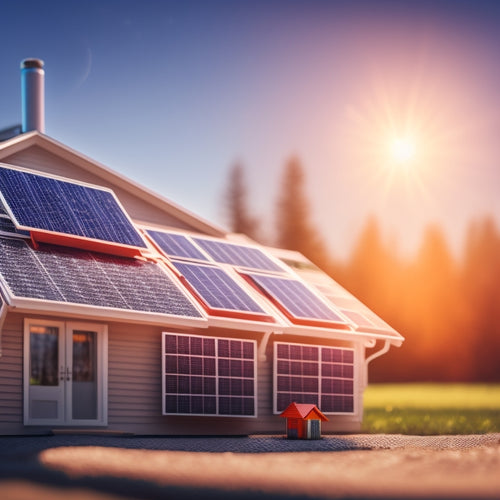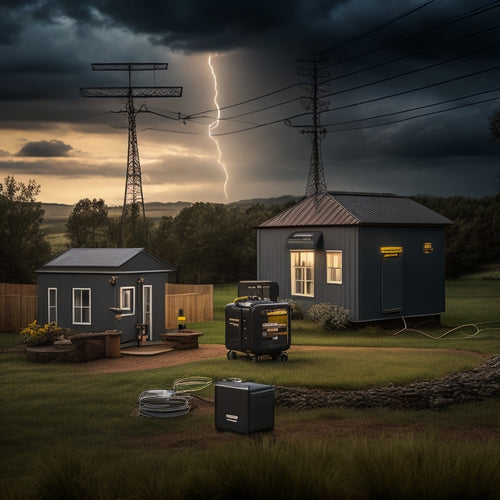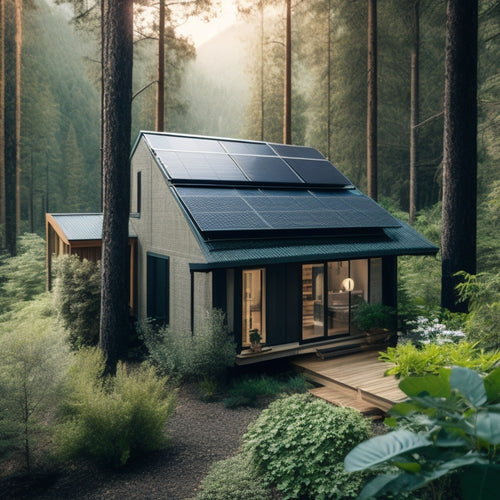
Small Solar Panels
Share
You'll find small solar panels ideal for powering devices on-the-go, enhancing off-grid freedom and energy independence. These compact solutions employ high-power density, achieving increased energy efficiency and supporting energy storage. Monocrystalline cells, with efficiency rates between 15% to 20%, maximize energy output. By considering hourly energy output in watt-hours and power consumption rates, you can optimize performance and minimize energy loss. With thinner designs and innovative materials, small solar panels fit into tight spaces, making them perfect for RVs, boats, and more. Now, investigate further to uncover how to optimize your energy generation and consumption.
The Essentials
- Small solar panels enable off-grid freedom, powering devices and appliances anywhere, anytime, and promoting sustainable energy independence.
- High-efficiency cells maximize energy output, optimizing power generation in compact spaces, ideal for RVs, boats, and remote workstations.
- Compact designs and innovative materials enhance flexibility, making small solar panels suitable for varied applications, from camping to urban rooftops.
- Scalable system design and energy storage solutions ensure adaptability to growing energy needs, while performance monitoring optimizes system effectiveness.
- Ideal for digital nomads and outdoor enthusiasts, small solar panels provide reliable, renewable energy, reducing reliance on traditional power sources.
Portability Boosts Off-Grid Freedom
You can take your small solar panels with you wherever you go, generating power on-the-go and keeping your devices charged.
With the rise of Renewable Energy Systems, outdoor enthusiasts and remote workers can now enjoy the freedom to traverse without worrying about energy availability.
This freedom from grid dependence enables you to venture further off the beaten path, unhindered by the need for a fixed power source.
With the ability to harvest energy anywhere, anytime, you're no longer limited by your location.
Power On-The-Go
Three key benefits of small solar panels come into play when considering power on-the-go: flexibility, convenience, and autonomy. You can utilize the power of the sun anywhere, anytime, without being tied to a wall outlet. This means you can recharge your devices on outdoor excursions, ensuring you stay connected and capture memories without worrying about battery depletion.
With the rise of portable solar chargers, such as foldable solar mats, you can now enjoy reliable energy access while reducing the weight and bulk of traditional solar panels. In addition, these sustainable solutions minimize environmental waste by offering a renewable energy source that doesn't rely on disposable batteries or fuel-powered generators.
Small solar panels enable travel convenience like never before. You can slip them into your backpack or attach them to your camping gear, providing a reliable source of power for your solar gadgets. Whether you're hiking, biking, or RVing, you can stay powered up with eco-friendly travel solutions.
Plus, in emergency situations, these lightweight options can serve as a lifeline, providing essential power when you need it most. With small solar panels, you're no longer limited by your device's battery life. You can roam freely, exploring the great outdoors while keeping your devices charged via solar charging.
Portable applications are endless, and the freedom to roam is yours for the taking. Welcome the possibilities and take your journeys to the next level with small solar panels.
Freedom Unplugged
Portability takes off-grid freedom to new heights as small solar panels enable individuals to journey further, stay longer, and examine more.
You're no longer tied to a specific location or energy source, giving you the flexibility to investigate new territories or stay put for as long as you need.
With the rise of renewable energy systems, small solar panels have become more efficient and accessible, making it easier to utilize the power of the sun anywhere, anytime, and store it in compact batteries for later use.
This level of solar independence means you're not reliant on traditional energy grids, allowing you to live life on your own terms.
As you journey off the grid, you'll find that small solar panels provide energy autonomy like never before.
You can power your devices, lights, and appliances without worrying about running out of juice.
Whether you're a digital nomad, an explorer, or simply someone who values independence, small solar panels give you the freedom to live life untethered.
Increased Energy Efficiency
You'll benefit from small solar panels' increased energy efficiency, which is achieved through high power density and superior system design.
High power density allows these panels to generate more energy per unit area, making them ideal for small-scale applications.
With top-rated solar panels like Tesla and SunPower offering high-efficiency options, homeowners can maximize their energy output.
High Power Density
The pursuit of high power density in small solar panels has led to significant advancements in increased energy efficiency, allowing these compact units to punch above their weight regarding energy production.
As you investigate the benefits of high power density, you'll find that it enables you to generate more energy per unit area, making the most of the available space. This is particularly important when dealing with installation challenges, such as limited roof space or restricted land use. With high power density, you can surmount these obstacles and still achieve your energy goals.
High power density also has a significant impact on energy storage. By generating more energy per unit, you can store excess energy for later use, reducing your reliance on the grid and increasing your energy independence. This is especially beneficial for those seeking freedom from traditional energy sources.
In addition, high power density solar panels can be designed to be more efficient in low-light conditions, making them ideal for areas with limited sunlight. By leveraging high power density, you can access the full potential of small solar panels and enjoy a more sustainable, reliable, and efficient energy supply.
Optimal System Design
In tandem with high power density, ideal system design plays an integral role in maximizing energy efficiency in small solar panels. When designing your system, you'll want to take into account scalability to guarantee it can adapt to your growing energy needs.
Installation methods are also vital, as they can impact the overall performance and longevity of your system. Energy storage solutions, such as batteries, can help you store excess energy generated during the day for use during the night or on cloudy days.
Cost considerations are significant, as the initial investment in your system can be considerable. However, with proper maintenance practices, your system can last for decades, providing a substantial return on investment.
Additionally, reflect on the environmental impact of your system, including the materials used in its construction and the land required for installation. Grid integration and regulatory factors must also be taken into account, as they can affect the feasibility of your system.
To guarantee peak performance, you'll want to implement performance monitoring and be prepared to adapt your system as your energy needs change. By contemplating these factors, you can create a highly efficient and effective small solar panel system that meets your energy needs while promoting freedom and sustainability.
Monocrystalline Cells Boost Power
You'll find that monocrystalline cells in small solar panels boast a high efficiency rate, typically ranging from 15% to 20%.
This is particularly significant for residential solar panels where space is limited and maximum energy output is essential.
Additionally, high-efficiency solar panels can help reduce the overall cost of a solar panel installation.
This means they're able to convert a larger percentage of sunlight into electrical energy.
As a result, they're capable of producing maximum power output, making them an ideal choice for small-scale solar applications.
High Efficiency Rate
During peak sunlight hours, your small solar panel's monocrystalline cells work in tandem to maximize energy harvesting, thanks to their high efficiency rate. This means that a larger percentage of sunlight is converted into usable electricity, making your solar panel more effective.
With high-efficiency monocrystalline cells, you can expect to generate more power per hour of sunlight, allowing you to utilize the full potential of renewable energy.
As you investigate the world of solar technology, you'll find that high-efficiency cells are a key factor in maximizing your energy independence. By leveraging the latest advancements in renewable energy, you can break free from relying on traditional power sources and take control of your energy needs.
With a high-efficiency rate, your small solar panel can provide a reliable and sustainable source of power, giving you the freedom to live life on your own terms.
Maximum Power Output
With monocrystalline cells at their core, small solar panels are capable of achieving maximum power output, thanks to the cells' exceptional ability to convert sunlight into electrical energy. This means you can utilize more power from a smaller surface area, making these panels ideal for compact spaces.
By optimizing power output, you'll be able to generate more electricity and reduce your reliance on traditional energy sources.
To maximize power output, you'll want to evaluate power optimization techniques, such as using maximum power point tracking (MPPT) controllers. These controllers guarantee that your solar panel system operates at its peak efficiency, even in varying weather conditions.
Additionally, incorporating energy storage solutions, like batteries, will allow you to store excess energy generated during the day for use during the night or on cloudy days.
Check Wattage Per Hour
You'll need to take into account the hourly energy output of your small solar panel, which is typically measured in watt-hours (Wh). This value indicates how much energy the panel can produce per hour of peak sunlight.
When integrating solar panels with advanced battery solutions, such as solar energy solutions, you can generate clean energy and save on electricity bills.
Your power consumption rate will also impact your energy needs, so it's crucial to calculate how much power you'll require per hour.
Hourly Energy Output
Efficiency is key when it comes to utilizing energy from small solar panels, and understanding hourly energy output is essential in maximizing their potential. You'll want to know how much energy your panel produces per hour to optimize its performance. Hourly energy output is measured in watt-hours (Wh), which is the amount of energy produced by your panel in one hour.
To accurately estimate hourly energy output, you need to take into account factors like energy fluctuations and usage patterns. Energy fluctuations occur due to changes in sunlight intensity, temperature, and other environmental factors.
Usage patterns, on the other hand, refer to your daily energy requirements, including peak and off-peak hours. By understanding these factors, you can adjust your energy usage to maximize the output of your small solar panel.
For instance, if your panel produces 100 Wh per hour during peak sunlight hours, you can plan your energy-intensive activities during this time to maximize energy output.
Power Consumption Rate
Your small solar panel's power consumption rate, measured in watts per hour, is a critical factor in determining its overall performance. This metric affects how efficiently your system utilizes solar energy and converts it into usable power. A higher power consumption rate means your panel is drawing more energy from the sun, but it also increases the likelihood of energy waste.
To optimize your system's performance, you need to strike a balance between power consumption and energy output. This is where power management comes into play. By monitoring your panel's power consumption rate, you can identify areas for improvement and make adjustments to maximize your energy yield.
For instance, you might need to adjust the angle or orientation of your panel to minimize energy loss.
When selecting a small solar panel, look for models with low power consumption rates to guarantee you're getting the most out of your solar energy investment. By doing so, you'll be able to enjoy the freedom and independence that comes with generating your own clean energy.
Thinner Design Saves Space
You'll find that compact solar panel designs offer a significant advantage when it comes to space constraints.
By reducing the thickness of the panel, you can fit more power in a smaller area, making them ideal for applications where space is limited.
With a thinner design, you can utilize more energy without sacrificing precious real estate.
Compact Solar Panel Design
In conjunction with advancements in photovoltaic technology, compact solar panel design has become an essential aspect of small solar panels, enabling them to fit seamlessly into tight spaces.
You're no longer limited by bulky panels that can't be easily integrated into your system. With compact designs, you can utilize solar energy in even the most confined areas, such as RVs, boats, or backpacks.
Innovative materials have played an important role in achieving compact applications. For instance, thin-film solar panels use less material than traditional crystalline silicon panels, making them much lighter and more flexible.
This flexibility allows you to mount them on curved surfaces or incorporate them into building-integrated photovoltaics. Additionally, state-of-the-art manufacturing techniques have enabled the production of smaller, more efficient solar cells.
These advancements have paved the way for compact solar panels that can be easily integrated into your daily life, providing you with the freedom to generate your own clean energy wherever you go.
Frequently Asked Questions
Can Small Solar Panels Be Used for Camping and Outdoor Activities?
When you're venturing outdoors, you'll appreciate portable power solutions that bring outdoor convenience to your camping and excursion trips; compact solar panels can be a reliable, eco-friendly option to keep your devices charged on-the-go.
How Do I Clean and Maintain Small Solar Panels?
Did you know 15% of solar panel energy output is lost due to dirt and grime? To maximize your off-grid freedom, you'll want to regularly clean your panels using gentle cleaning techniques and follow maintenance tips like inspecting for debris and tightening connections.
Are Small Solar Panels Compatible With USB Devices?
You'll find that many solar panels, regardless of size, can charge USB devices, but you'll need to take into account the solar panel efficiency and ascertain the panel's USB power output matches your device's charging requirements for peak performance.
Can I Charge My Laptop With a Small Solar Panel?
You can charge your laptop with a solar panel, but it depends on the panel's efficiency and your laptop's power requirements. If you need portable power, look for a panel that can deliver the required wattage to keep your laptop running freely.
Do Small Solar Panels Work in Low-Light Conditions?
When you're off-grid, you'll want to know if your panel can perform in low-light conditions. Check the efficiency ratings, as they'll impact low light performance; some panels are designed to optimize energy harvesting in shaded or cloudy environments, so you can stay powered up.
Final Thoughts
As you weigh the benefits of small solar panels, remember that every watt counts. In fact, did you know that a single small solar panel can power a smartphone for up to 10 hours on a single charge? This statistic highlights the significance of portability in off-grid energy solutions. By utilizing the power of small solar panels, you can access new levels of energy independence, wherever your expedition takes you.
Related Posts
-

A Beginner's Guide to Navigating the Solar Investment Tax Credit
You're eligible to claim a significant Solar Investment Tax Credit (ITC) of 30% of total installation costs, but mane...
-

Key Components of a Reliable Emergency Power Supply System
A reliable emergency power supply system requires several key components. You need proven performance metrics to guar...
-

Off Grid Solar Batteries
As you shift to off-grid living, you'll rely on high-performance solar batteries to store excess energy generated by ...


